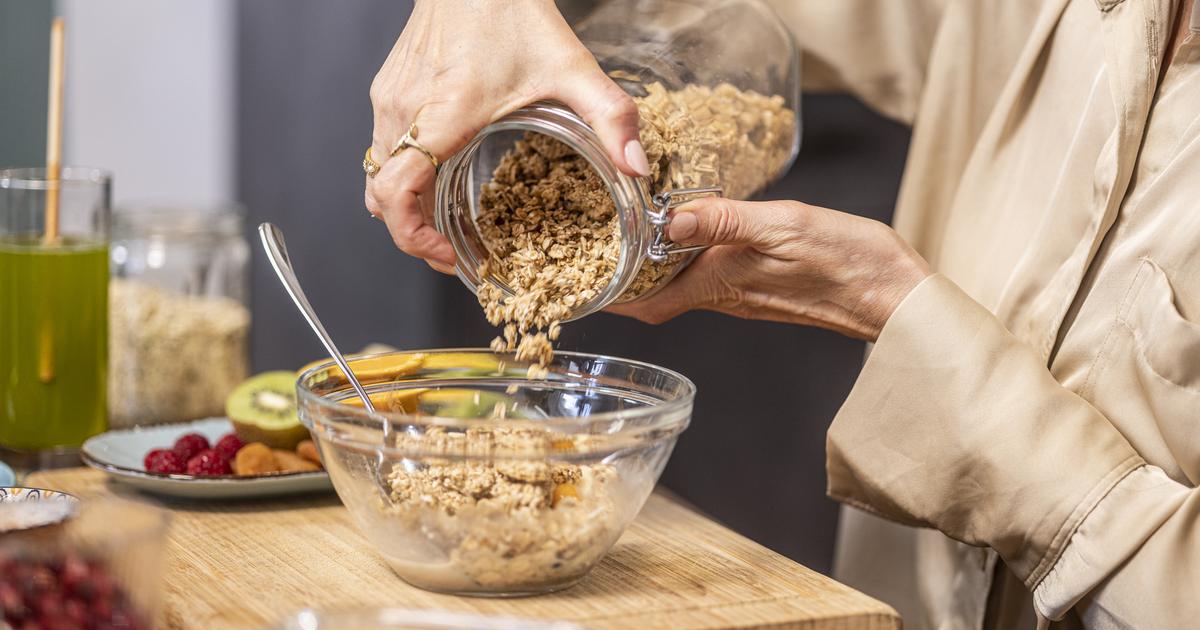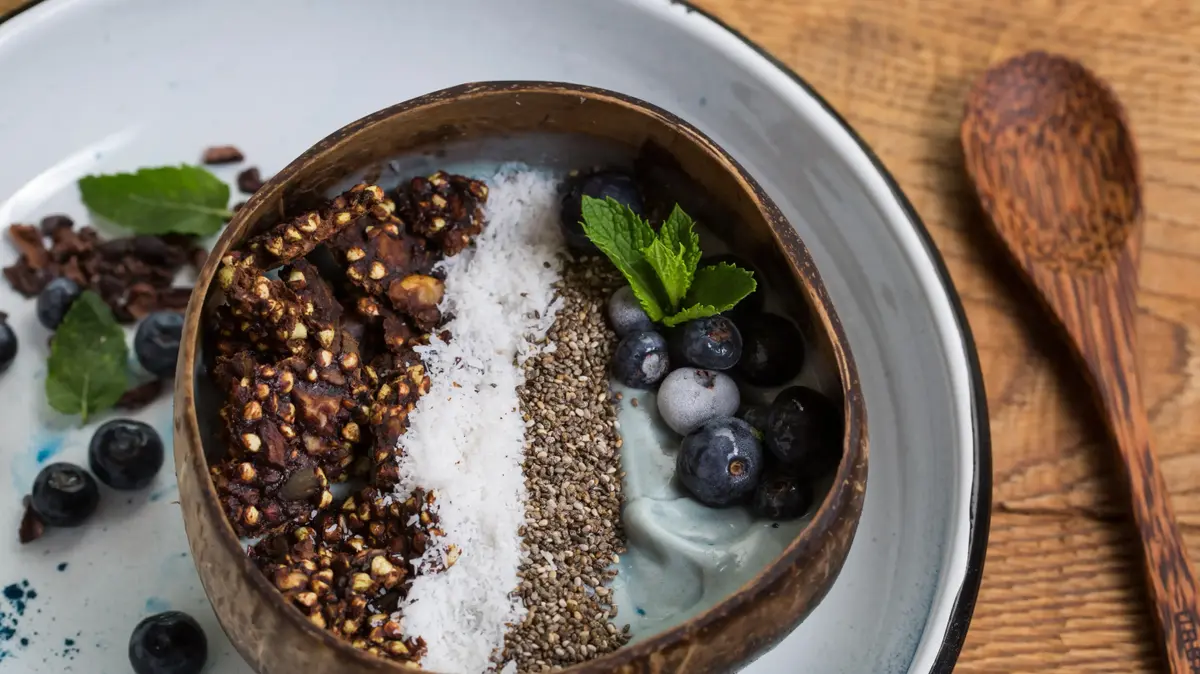The yogurt industry never ceases to amaze us.
And I say “yoghurt industry” and not “dairy industry” because in the range of vegetable yoghurts there are also new products continually coming out.
Until recently, when choosing yogurts we had two options: plain or sugared/sweetened.
In general, all flavored yogurts fall into the sugared or sweetened category.
And the choice was simple: the natural one, whether we were talking about soy yogurts or classic yogurts.
The disclosure has already dismantled several batches of yogurts supposedly healthier than natural ones: those that make your gut happy, those that help your defenses, 0%, those rich in fiber... we already know that no, they do not improve natural yogurt .
But now we have a new generation of creativity in 125g cups and it may not be so clear to us whether we have finally improved natural yogurt or not.
Let's take a tour of the latest novelties of the yogurt fridge and, when we finish, we will draw conclusions.
Remember that we are talking about those products that involve fermentation and contain live microorganisms, not desserts such as custard, flans, mousses, etc.
protein yogurts
I think they have been the star of healthy
yogurts
of the moment for months, I am sure you have seen them: there are many flavors, but all of them indicate the word “proteins” very large on their front and usually also the number of grams they contain. of said nutrient.
A natural yogurt has 3.3-3.7g of protein per 100g, or around 4g per 125g glass, which is the most common presentation.
Protein yogurts have double or more that amount (8-10g per 100g), that is, they really deliver what they promise.
It is a yogurt that does not have added ingredients to achieve this increase, but rather is drained, so it becomes a thicker yogurt, with less water and, therefore, more concentrated in nutrients.
It is true that these products can be useful in diet therapy, in patients who need to reinforce their diet or for people with certain needs since they offer greater satiety and more nutrients in less volume and, within the current offer, these yogurts would be the ones that would come out better stopped, no doubt.
But it is also true that we do not need more protein, so it is not necessary to pay an extra cost for them.
They are not a deficient nutrient in the diet.
In fact, the protein consumption of the Spanish population is more than assured, and foods of animal origin are the main source, so it does not seem to make much sense to focus on promoting neither this nutrient nor its origin if it is not for a specific reason. commercial.
Are they a better option than a traditional natural yogurt?
They can be in some cases, but only if we choose a version that is also natural, because many of these protein-rich yogurts also have their good contribution of sugar or sweeteners.
Especially the flavored ones, with fruit or chocolate.
And that is not worth it.
Do you know how you can add those extra 5 or 6g of protein to a normal natural yogurt?
Throw in a good handful of nuts and seeds, and you also get many other micronutrients and fiber as a gift.
Non-soy vegetable yogurts
Natural soy yogurt, as healthy as cow's yogurt if there is any doubt and more sustainable, is no longer exotic on the shelves.
I think that all the big companies that make yogurt already have their line of soy yogurts and they also exist in all the white brands.
It is a consolidated product in the market.
So now the
coolest
thing is vegetable yogurts from something else.
The coconut and almond ones are especially successful.
There are also those that mix soy with coconut, with oats... but it is not the ones I am referring to.
Alpro was one of the first large distribution brands to launch a 100% coconut yogurt (until then they existed in minority brands in specialized stores and at exorbitant prices), and white brands such as Carrefour have already jumped on the bandwagon.
Its ingredients are basically coconut, water, starch and bacteria.
Do you know how you can add those extra 5 or 6g of protein to a normal natural yogurt?
Throw in a good handful of nuts and seeds, and you also get many other micronutrients and fiber as a gift
Nutritionally, this type of yogurt is of little interest;
it is low in protein and calcium and higher in fat than a soy yogurt.
Its interest is above all organoleptic: it is good.
And because of its ingredients, it is healthy.
Although, as we say, the only reason to pay the extra cost that it represents compared to a soy one, is the taste or texture.
The almond version has been introduced in the supermarket by the Kaiku brand (there were also brands that are not sold in the supermarket), and its ingredients are similar to the previous one, but changing coconut for almond in its "natural" version, which is the unique without added sugars.
The comment that we can make is practically the same as that of coconut.
On a purely nutritional level, the classic version (that is, soy yogurts) is still a better option than these delicacies (they are so good, I can attest to that).
Natural 'premium' yoghurts
Within the range of classic natural yogurts there is also a remarkable trend: making more
gourmet
versions .
Danone brings out its natural yogurt in a glass cup made with the 1919 recipe according to the brand and whose difference with normal natural yogurt (the one in a plastic cup) apart from the price and the packaging, is that it has cream and that increases its quantity of fat and I imagine that it makes it more unctuous and palatable.
But certainly not healthier.
The same brand has recently launched another special natural yogurt: it is a liquid yogurt to drink that has the Realfooding seal.
In this case, the only difference at a nutritional level with a private label natural drinkable yogurt is the price.
Danone's almost triples it, without any justification other than marketing.
Other brands offer us organic natural yogurts, grazing milk, artisanal with milk from pasture cows (this says on the Pastoret packaging) and other similar legends.
Again, the nutritional difference with the natural yogurt on offer at the supermarket is minimal.
At most, again, they have more fat content in the form of cream, and their prices can reach 4 or 5 euros per kg.
This is where the consumer values the type of production, for example, although if we are concerned about the treatment of the cows, the yogurt we have to buy is soy yogurt.
There are no happy cows producing things that are sold in supermarkets, make no mistake about it.
Kefir
Kefir deserves a mention because it has become very popular in a very short time.
It has gone from being something
hippies
did at home to having three varieties of Squire at our disposal;
other brands such as Danone or Nestlé have also jumped on the bandwagon.
The difference between kefir and yogurt is the type of microorganism used to ferment the milk, which in the case of the former is a fungus and in the case of yogurt it is bacteria.
Kefir is also more liquid and is usually somewhat more acidic than yogurt, and a small amount of alcohol can be produced during its fermentation, although this is controlled in industrial varieties so that it does not appear in the final product.
Nutritionally there are no big differences between yogurt and kefir.
It is true that kefir provides a greater variety of microorganisms in the form of probiotics, but it is not a particularly relevant issue either.
Therefore, choosing one or the other will depend more on our personal taste than on nutritional criteria.
Mercadona has in its private label a vegan kefir made from coconut but with added sugar in the form of agave syrup, so it would not be for regular consumption.
Animal milk versions of the same brand, on the other hand, do not contain sugar.
goat yogurts
Although goat milk products are not even remotely new, it is true that until recently the only thing we could find in a supermarket made from this animal's milk was cheese.
But right now, finding goat's milk yoghurts is quite easy and even well-known chains already offer them under their own brand.
The good thing is that, in this case, it is usually natural yogurts, that is, healthy ones.
But their price is considerably higher than that of their cow counterparts, and there are those who choose them simply for a taste issue, which seems to be more intense in this type of yogurt.
At a nutritional level, the differences with a natural cow yogurt are irrelevant;
it has a little more calcium and some difference in protein and fat, but so small that it does not make sense to point it out in the usual consumption portions.
What is certain is that it may have greater tolerance in some people with digestive problems since its content of a specific protein (alpha-casein) is lower and since this protein is responsible for a large part of allergies to cow's milk, it makes goat milk is considered hypoallergenic (but beware, those allergic to cow's milk should not consume it),
Its lower lactose content also helps its digestibility, although it should be noted that the lactose present in any yogurt is low because it has been fermented by the bacteria that transform milk into yogurt and largely decomposed.
Goat's milk is more similar to human milk than cow's milk, therefore it is perfectly normal that its tolerance in our species is better.
Think about the animals and the planet
I do not want to close the article without leaving an extra-nutritional comment: all products made with milk from any animal involve animal exploitation.
I am not going to tell you about the life and death of a cow destined for milk production, there is a lot of information available for those who are interested.
Likewise, it is also important to bear in mind that food is the consumer good that has the greatest environmental impact over transport or technology, as the Ministry of Consumption pointed out to us a few days ago, and within it, meat and dairy products occupy the first posts.
As consumers, we should not only care about the nutritional factor or the health arguments when choosing a product, especially if we can choose between several options, the product is not essential and there are better alternatives for the planet and all its inhabitants.
And so?
So it seems that if we value the nutritional aspect and the price, the best option is still natural yogurts (cow or soy).
But if we introduce ethics, animal exploitation and sustainability into the equation, natural soy yogurt is left alone as an option that meets everything.
You can choose one of the other options that we have mentioned, for a matter of flavor or personal taste, not for nutritional criteria.
Lucía Martínez Argüelles
(
@Dimequecomes
), is a dietitian-nutritionist, with a master's degree in nutrigenomics and personalized nutrition.
She directs the Aleris Center and is the author of several books and the blog
www.dimequecomes.com
.
NUTRITION WITH SCIENCE
It is a section on food based on scientific evidence and the knowledge contrasted by specialists.
Eating is much more than a pleasure and a necessity: diet and eating habits are now the public health factor that can most help us prevent many diseases, from many types of cancer to diabetes.
A team of dietitians-nutritionists will help us to better understand the importance of food and, thanks to science, to break down the myths that lead us to eat poorly.
You can follow
EL PAÍS Salud y Bienestar
on
,
and
.






